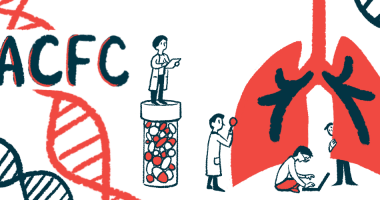Trial of CF gene therapy SP-101 begins dosing, is still recruiting
SAAVe study to test inhaled treatment in 15 adults at US study sites

A Phase 1/2 clinical trial testing the inhaled gene therapy SP-101 in adults with cystic fibrosis (CF) has begun dosing, and is still recruiting participants, according to its developer Spirovant Sciences.
The trial, called SAAVe (NCT06526923), aims to enroll 15 CF patients, ages 18 to 65. To be eligible, participants must have stable disease and have a percent predicted forced expiratory volume in one second (ppFEV1) from 50% to 100%. ppFEV1 is a measure of lung function based on how much air someone can blow out in a forceful breath.
All participants will receive a single administration of SP-101 in combination with one of two doses of doxorubicin, a chemotherapy molecule that’s expected to boost the activity of the CF gene therapy candidate.
Recruitment is ongoing at sites in Kansas City, Kansas, and New York City. Additional sites in Philadelphia and Boston are also expected to participate in the Spirovant-sponsored study, but are not yet recruiting, per the trial site.
“The dosing of the first patient in the SAAVe Phase 1/2 clinical trial is a major milestone for Spirovant and for the cystic fibrosis patient community,” Roland Kolbeck, PhD, chief scientific officer of Spirovant, said in a company press release.
Spirovant gene therapy may treat modulator-ineligible CF patients
CF is caused by mutations in the gene CFTR, which encodes instructions to make a protein of the same name. The CFTR protein is needed to regulate mucus production in the body; in CF, the lack of functional CFTR protein leads to the production of unusually thick and sticky mucus that builds up in organs and causes damage, ultimately driving disease symptoms.
SP-101 is designed to deliver a miniature, functional version of the CFTR gene to cells in the lungs, allowing lung cells to make a working CFTR protein. The therapy delivers its genetic payload using a version of adeno-associated virus, or AAV, that’s been engineered to deliver the therapeutic gene instead of causing infection.
[SP-101] is mutation agnostic and as such has the potential to treat a range of cystic fibrosis patients, including those who are not eligible for treatment with … CFTR modulators as well as those for whom … CFTR modulators are insufficient.
According to Spirovant, SP-101 is intended to address the underlying cause of the disease irrespective of the specific CFTR mutations that patients may have. This is in contrast to available CFTR modulators, which are medications that can boost the activity of the defective CFTR protein but only in people with specific CF-causing mutations. Importantly, approximately 1 in 10 people with CF cannot benefit from modulator therapy.
SP-101 “is mutation agnostic and as such has the potential to treat a range of cystic fibrosis patients, including those who are not eligible for treatment with … CFTR modulators as well as those for whom … CFTR modulators are insufficient,” Kolbeck said.
Claire Keating, MD, a study investigator at Columbia University Irving Medical Center in New York, called the first dosing of SP-101 “a major development,” adding that this trial is “advancing a novel potential treatment pathway that moves us towards our goal of effectively treating people with CF who currently are not eligible for other highly effective therapies.”








